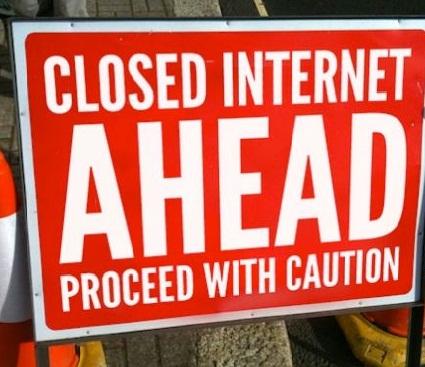Net Neutrality: Do we need to regulate the Internet?
Over the last few months, the issue of net neutrality has been hotly debated by Netizens. The deals struck for instance between Airtel and Flipkart, to provide free access to the e-commerce website, have attracted tremendous criticism for skewing the online market.
The Telecom Regulatory Authority is presently examining the issue, having issued a consultation paper that seeks public opinion on the issue (in particular, whether to license communication applications and services that run over the Internet). The Competition Commission of India and the Department of Telecommunications are also apparently examining the issue in order to determine whether any regulation is required to protect the 'openness' of the Internet.
Newsclick interviewed Rishab Bailey, Director Legal, Society for Knowledge Commons to discuss the issue of net neutrality and the importance of protecting the principle. Rishab in the interview talks about how protecting the principle is essential to maintain competition in the online space, ensure diversity of content and ensure all content is equally accessible. He points out how this is particular important for a developing country like India - which still does not create much local content. Rishab believes that the consultation issued by TRAI is nothing more than an attempt at putting in place an unworkable licensing regime, which will benefit incumbent telecom companies at the cost of both the user as well as content and application providers on the Internet.

Rough Transcript:
Nishant Saxena - Hello and welcome to Newsclick. Net Neutrality is the principle that all legal content on the Internet must be equally accessible to all the users and ISPs that is Internet Service Providers must not favor, block or slow down any content on it. Now there are concerns that telecom operators will discriminate against certain type of contents for commercial purposes. This will hurt consumers and diminish online innovations. Today to discuss the issue of Net Neutrality, we have with us Rishab Baily, Director Legal, Society for Knowledge Commons. Hello Rishab, welcome to Newsclick. Rishab, what is the principle of Net Neutrality and why is this important?
Rishab Bailey - Now when you as a user go on to the Internet, you pay your Internet Service Provider, your telecom service provider who gives you that connection, you pay him to be able to access all content on the Internet. So once you are on the Internet, you can essentially go from website to website, service to service without being charged extra, depending on what kind of service or what kind of website you are actually going to. So basically, anyone can connect to any application service or to another person or to another user online. And any one can actually offer any legal services online. So Net Neutrality attempts to preserve this openness of the Internet that allows everyone to connect with everyone else. Essentially why this principle is important is that it prevents the emergence of monopoly in the context of the Internet. If you have a situation, where content providers; for instance can be telecom operator to ensure that their content is provided to you, the user at a preferential, either rate or cheaper or so on, it is likely to lead to more and more users using that particular service at the cost of any other service, which basically means that, all big content payers will do very very well but at the cost of smaller content players. This obviously therefore acts as a barrier to entry into the market for a new service provider or a content provider and curtails innovations in the market. It also limits the choice that the consumer has in terms of what content he usually want to access on the Internet, which is why it is particularly important to protect this principle, given that it also acts as an incentive for Internet service providers to actually invest in increase the capacity or the bandwidth that is available to the users generally. Unlike in the case of most other goods, see in the case where traditional company, if i am producing for example soft drinks, if I sell more soft drinks, I will make more money. If I am producing more goods, I will make more profit. Bandwidth however does not work like that, I mean in fact it is in the interest of telecom company to restrict the amount of bandwidth and charge more for same scarce resource. So Network Neutrality attempts to combat this as well. So at the root of the issue of Network Neutrality is a question of how do you actually view the use of Internet. I mean do you view as a public utility in much like say electricity or do you view it as like club, a cable television? I think you are familiar with the factor that, in our cable television services today, you get some channels on Tata Sky, you don't get some channels on Airtel. You as a user have absolutely no choice about what you can decide. I want to get Tata Sky or I want to get Airtel and within those, you can choose a book ' f ' channels but you can't decide what channels Tata Sky is going to carry. This restricts your choice of content to access. And this exactly the battle that taking place on the Internet. Do you want telecom company to able to say, you will only be able to use 'x' search, 'x' email or 'x' access, a, b and c websites? No, you want to able to access choice that is available on the Internet as long as it is illegal, that is what is at stake here when we discuss about the principle of Network Neutrality.
Nishant - Telecom services claim that the growth of Internet has hampered or hindered their increment in the revenue. Now how true is that? and If the violation of Net Neutrality takes place and we start prioritising the things that these telecom services are demanding for, how do you think the things are changing and will that compensate?
Rishab - There are two separate questions you have asked. Firstly on the issue of whether communication services and applications that are on the Internet, such as Skype and so on, whether they are actually eating into the revenues of your traditional telecom companies and whether in fact that make the business of these telecom service companies inviable? Now first you have to keep in mind that there is completely, I mean there is a lot of misinformation being spread by the telecom industry, which obviously wants to ensure that they have multiple sources of revenue. What they don't tell you that, data revenue or the revenue they receive from customers who use data to access the Internet is actually rising at a tremendous rate. There have been multiple studies conducted by groups like McKinsey and so on on this issue, who have all forecasting massive rises in the data revenue for these companies. Secondly, you just have to look at the reason statements by any of these companies that is Vodafone, Airtel so on, who have in their annual reports consistently indicated massive profits have been made over last few years. Now if you actually look at figures in the ground, you actually have increasing number of voice users in India because we do not have yet 100% penetration for even voice service. So to say that voice services have been cannibalised, this is completely wrong. Absolutely there is no evidence to this effect. In fact because people have been able to use services like Skype for relatively cheap, people are actually talking more on the phone than they would normally. I think you remember back in the day we used to think five times for making an international call, we used to ended it as soon as possible. But now people are actually be able to talk for longer, to be able to make more calls. And this in turn driving data revenue for the very same telecom companies, who claim they are loosing out of money. So that is absolutely untrue.
Nishant - Now Airtel and Vodafone we have just seen that have been lobbying with TRAI and what they are trying is to ensure licensing on communication services like Skype, WhatsApp and other communication services or what they want is every time a user uses these services, you pay them extra charges. How do you think it is going to change the things and what is going to be?
Rishab - Well, implementing any licensing system firstly is going to be, I would think extremely unworkable in the context of Internet. I mean there is a plethora of online applications that allow you to do real-time communication; chat, so on so far. I mean they are ranging from G-chat to your Facebook chat, to your Facebook itself, to x number of real-time applications that allow to communicate. So if the Government of India is actually going to try license each and everyone of these, it is actually gona a either result in 1. Indian customer being denied access to many of these services and applications 2. It is going to create a high cost of entry into the market. So any one who wants to provide a new service, it is going to be far tougher for them to, to go through this regulatory, red tape in order to get a license. At the same time, if you allow a telecom company to charge for every call that they supposedly loose on account of calling around Skype or something, firstly there is no evidence is to say that there is no direct substitute. You are not using a Skype call and therefore you are directly costing a telecom company. You might never have made that call, you might be making because Skype is so cheap as I mentioned. In any event, this is likely to lead to increase in cost for the user which is something obviously that there is no basis for. All it will do is increase the super profit made by the telecom companies which are already in very very good health.
Nishant - In the context of India, how do you think these licensing is going to solve the problem of privacy in communication and security?
Rishab - TRAI in it's consultation paper which has released on the issue has actually spoken about how there is a need to ensure the public interest regulation is possible of these application services on the Internet. And they pointed to things like private concerns and security concerns in this context and said I am asked whether licensing regime can be implemented to ensure these concerns are met? I actually don't think that the licensing system is necessary to ensure that the privacy rights of citizens of India and so on can be protected. What we need a strong privacy laws and we actually do not have very strong privacy laws at the moment. We have a privacy bill which is been pending with govt. now for a few years and we haven't really seen too much movement on that. So our Indian laws are apply to content or to applications and services that are generally accessible in India using the Internet. So as such, there is no need to implement a licensing system in order to having these laws apply. The IPC will always apply, the Indian penal code for instance will always apply to even Skype for instance. So there is no connection between a licensing regime and forcing our Indian laws in the context of Internet.
Nishant - Last question Rishab, What is the legal situation in India concerning Net Neutrality?
Rishab - Well, As we just been discussing, we have absolutely no laws on this as of now, no regulation now. Though of course our Competition Commission which authorized to look at instances where there are market failures can look at the grievances which adversely affect competition in the market and the online market is equally under their jurisdiction. In fact, I understand the Competition Commission is currently looking at certain practices that they believe for fall of Net Neutrality and all therefore skewing the online market. As I mentioned TRAI is released a consultation paper which also looks at the issue of Net Neutrality and this been off-late a lot of attention by the media as well as Netizens who are anxious to ensure that Telecos do not actually control of the way the Indian citizens can access the Internet. So there are various petitions run in online which I would urge you to sign up on and do many tweet and blog about this issue as well. But we are in sort of a critical stage at the moment because it looks the govt. has taken notice of the entire debate and it does look like you will have some form of regulation covering these issues coming up shocking. What form exactly that regulation takes, whether it actually sufficient to ensure citizens' rights are protected and there is a transparency in the provision on Internet services? that we have to wait because that will dependent to large extend on the pressure we as citizen can bring to bare on the govt.
Nishant - And a very important thing what we have seen on Internet, little start-ups. Face Book was started in a hostile dormitory, Whats-up is run by only fifty people and even Newsclick. How it is run? I mean there are so many start-ups. How do you think is the violation of Net Neutrality going to harm all these start-ups and are there regulatory committees who are working on, if Net Neutrality should be there or not? Are they even focusing on such questions? How it is going to harm the booming business over Internet?
Rishab - Yeah absolutely correct that one of the things about the Internet is the fact that any one can provide a service and the fact that you have a principle which today. As you correctly mentioned, I mean today's Facebook, Google and so on wouldn't exist if this principle of openness of the Internet or this principle of Net Neutrality was not in place. Because what it would mean is that in today's world, for instance if Face Book or Google pays your telecom company to ensure that you have preferential access whether it faster speeds or you have exemption from data caps and so on when you are accessing their sites, no competitor, small or big is ever actually going to be able to get any eye balls, is going to able to viewer it's content. So this is a huge damper, there for the innovation as I mentioned as barriers to entry to the market. Now this is actually something that has been taken to account by many many countries across the world. So you have a lot of this South American countries, for example Brazil, Argentina, Chile and so on who have taken up this issue of Net Neutrality and have actually passed the legislation to protect this principles. You also have countries like Netherlands and Slovenia which have legislations on this regard and of course you have the United States, Canada, many other countries where you have sector specific regulations which actually puts in place strong regulation protect this principle. Because it recognizes the world over that the protecting Net Neutrality is essential towards maintaining a free and a fair market place in the context of the Internet.
Nishant - Thats all for today Rishab. TRAI has already received more than two lakh petitions to protect Net Neutrality and we hope it is protected and Internet is used in a same or a better way like it has been, will get back to you on such issues. Thank you for coming.
DISCLAIMER: Please note that transcripts for Newsclick are typed from a recording of the program. Newsclick cannot guarantee their complete accuracy
Get the latest reports & analysis with people's perspective on Protests, movements & deep analytical videos, discussions of the current affairs in your Telegram app. Subscribe to NewsClick's Telegram channel & get Real-Time updates on stories, as they get published on our website.
























